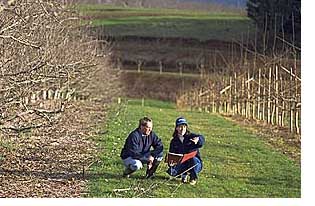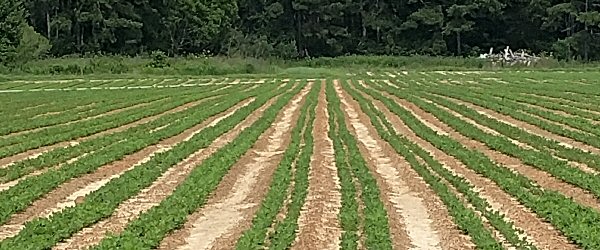Putting the Farm Bill to Work was a program to expand opportunities for farmers, specialty crop producers, and other growers new to Farm Bill programs, to support their use of environmentally sound farming practices through participation in the Conservation Programs authorized by the 2002 Farm Bill. CAP’s program included specialty crop producers from across the nation:
- In Michigan with asparagus, cherry, apple and nursery growers on the western shore of Lake Michigan;
- In California with walnut, almond, dried plum and peach growers in the Sacramento Valley;
- In North Carolina with nursery, Christmas tree, vegetable, apple, sweetpotato and strawberry growers in the foothills and mountains.
Working with a wide range of partners in each state, Putting the Farm Bill to Work helped to:
- Increase knowledge among growers about conservation program opportunities print and web-based media
- Increase access for specialty crop growers to participate in the conservation programs through its Succeed with EQIP guidance customized for each grower
- Increase opportunities for growers by collaborating to ensure that conservation program incentives and priorities are appropriate and effective in their operations
The 2002 Farm Bill created opportunities for specialty crop producers to participate in a number of conservation programs. The largest of these is the Environmental Quality Incentives Program (EQIP) which is available nationally. The Conservation Security Program (CSP) was started in the spring of 2004 and offers long term contracts that support growers who have already undertaken conservation practices on their farms and are interested in expanding that work.
Participation in conservation programs has several near and long term advantages for specialty crop producers:
- Financial assistance made available through the programs enables growers to offset some of the cost of implementing environmental improvements
- Participation in the program enables growers to adopt practices that produce significant environmental benefits, thereby dealing with regulatory mandates or avoiding the need for regulations.
- Since participation in the programs is voluntary, growers are able to choose the practices that make the most sense for their operations.
- Conservation programs that provide assistance to farmers have special significance in global trade negotiations since they are "green box" — that is, they are deemed to be minimally trade distorting and therefore excluded from domestic farm support reduction commitments.
EQIP, CSP, and other conservation programs which address specific resource issues, are administered by the Natural Resources Conservation Service (NRCS), an agency of the U. S. Department of Agriculture (USDA), which has offices in every state.
For more information on the NRCS office in your state go to: http://www.nrcs.usda.gov/about/organization/ regions.html#state and click on your state. For your local county NRCS office look on the left hand side of the front page for the state NRCS office under "Quick Access" and click on "Find a Service Center".
Putting the Farm Bill to Work Quick Links
- Appalachian Region
- California
- Georgia
- Michigan
- North Carolina
- North Carolina Apple Growers
- North Carolina Nursery Crops
- North Carolina Christmas Trees
- North Carolina Strawberry Growers
- North Carolina Strawberry Survey
- North Carolina Sweetpotato Producers
- North Carolina Sweetpotato Survey Summary
- Western North Carolina Vegetable Growers
- Oregon


